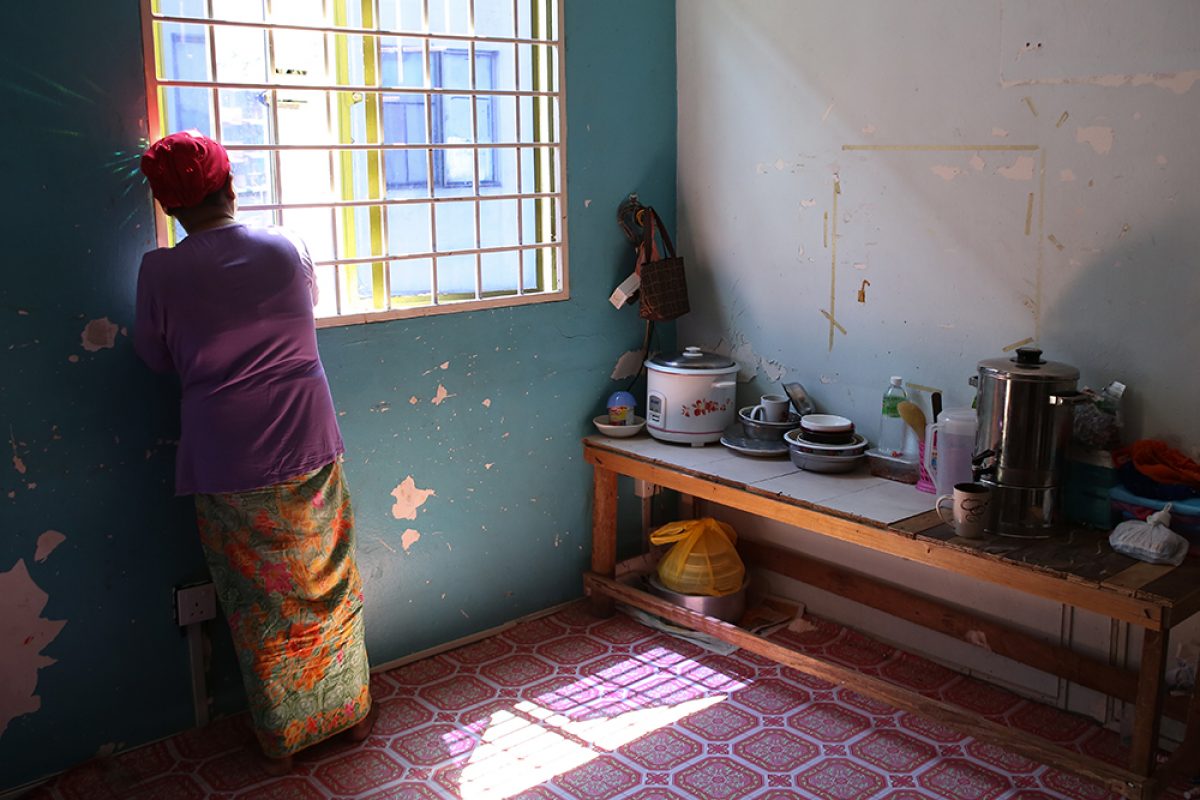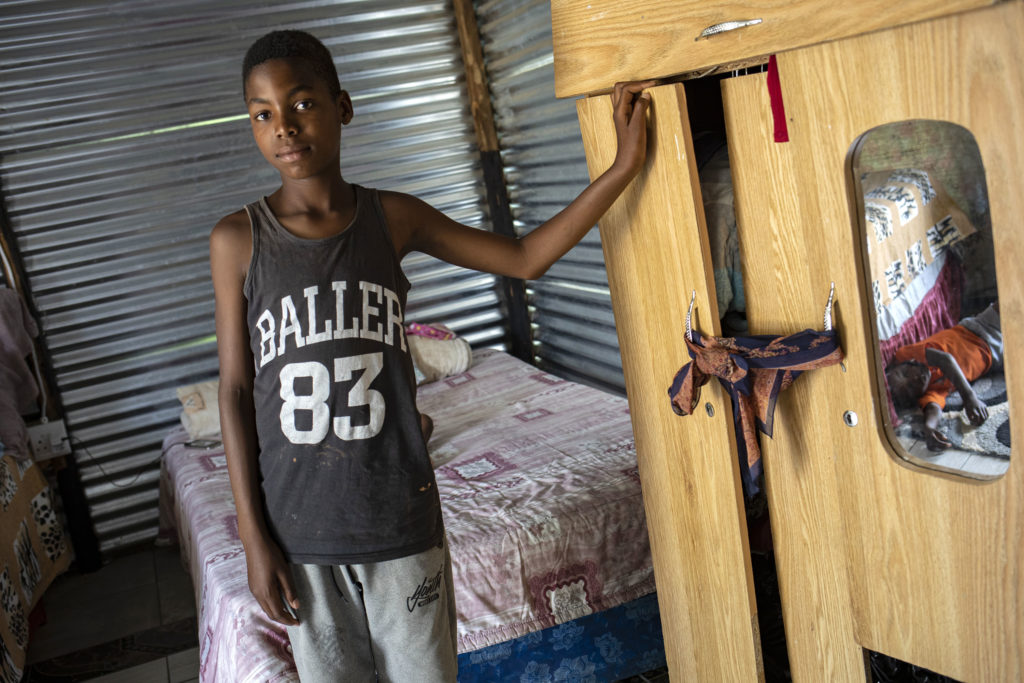Photo: Two girls take part in an activity at the child-friendly space at ICMC’s protection center in Irbid, Jordan. The safe space allows vulnerable children to develop social skills and build resilience. © Stefano Schirato/ICMC
In 2020, ICMC protection programs in Jordan, Malaysia, and Pakistan responded with flexibility, creativity, and resilience to the challenges of the COVID-19 pandemic. ICMC staff shifted to remote platforms to meet the needs of vulnerable refugees. They adopted physical distancing and other infection prevention measures in order to maintain vital, in-person safe spaces, shelters, and other protection services, as allowed by national health directives.
Protecting Children at Risk
Uprooted children face an increased risk of violence and exploitation due to their young age. ICMC provided protection and care for vulnerable children in both refugee and host communities.
In 2020, ICMC’s child-friendly spaces in Irbid and Mafraq, Jordan, offered over 6,125 refugee children a safe place to play and learn.
ICMC Jordan worked to prevent child marriage by offering life-skills courses to some 125 girls from refugee and host communities in the northern part of the country. The peer-group sessions covered a range of topics from adolescent health to financial literacy and basic computer skills. The supportive interaction helped to reduce social isolation. The sessions also equipped girls to respond to threats to their safety and well-being, built their resilience, and helped to open a path to a better future.
A new partnership with the Raskob Foundation in 2020 enabled ICMC Jordan to expand its activities supporting adolescent girls who are at risk, or survivors, of child marriage. A total of 70 girls participated in a life-skills program for married minors launched by ICMC at its protection center in Irbid, and six girls received individual counseling support. ICMC trained ten community leaders to raise awareness about child marriage and gender-based and other violence against children, and to promote positive parenting and action that protects children and their rights.
In Pakistan, ICMC opened a community youth center in Hassan Abdal, an urban area northwest of Islamabad. The new venture aims to empower younger refugees and strengthen relationships between refugee and host communities.
“ICMC is committed to promote the best interests and the rights of children and to ensure that their physical, emotional, social, and spiritual well-being is respected, safeguarded, and protected in accordance with international standards.”
From ICMC’s newly revised Child Safeguarding Policy, effective from 1 December 2020
In 2020, over 50 youth took part in two-day training sessions on civic engagement, leadership, and conflict resolution. Young people from both refugee and host communities engaged in safe recreational activity through cricket matches.
During the last quarter of 2020, ICMC Pakistan began an initiative to strengthen relationships between Afghan refugee and host communities in the twin cities of Rawalpindi-Islamabad. In addition to support for adults, the new urban cohesion hub offered opportunities for children from both communities to engage together in age-tailored learning and recreational activities.
Holistic Support for Highly Vulnerable Groups
In 2020, ICMC protection services responded to incidents of sexual and gender-based violence (SGBV) and supported survivors to rebuild their lives in safety and dignity. ICMC raised awareness about SGBV, launching initiatives to increase the capacity of refugee and host communities to offer a safe, protective space for all. And ICMC provided targeted psychosocial support to reduce the vulnerability of uprooted people and host communities.
ICMC Jordan protection centers in Irbid and Mafraq raised awareness about preventing violence and promoting social well-being. A total of 4,330 refugee and host community members discussed topics like child marriage, positive parenting, intimate relationships, managing emotions, SGBV, and gender equality.
Over 30 men and boys completed training on enhancing gender equality and protection for vulnerable community members. The participants took a closer look at what SGBV is, where stereotypes regarding male and female roles might exist, and how such attitudes are linked to social problems. The men have since started their own awareness campaigns in their communities in Irbid and Mafraq.
ICMC provided psychosocial counseling to 300 adults and children to deal with issues such as stress, depression, anxiety, and bedwetting. ICMC counselors also developed rapid intervention materials to address COVID-related mental health concerns, one of the first humanitarian actors in Jordan to do so.
![]()
When I reached out to ICMC, I was in very bad shape. I was neglectful of my well-being, and that of my family. [Now] I have learned important skills to manage my anger in order to get a better grip on my personal and family life.
43-year-old Jordanian woman in Mafraq, Jordan
ICMC Malaysia responded to SGBV in Rohingya and other refugee communities in Kedah state, Kuala Lumpur and the urban Klang Valley, and Penang. In 2020, nearly 2,200 vulnerable refugees received assistance through direct response, support services, and outreach activities adapted to pandemic realities.
ICMC’s case management unit helped nearly 300 refugee survivors of SGBV, the majority women. Survivors were able to report incidents of abuse, find safe shelter, get counseling, and receive emergency funds.
A total of 115 survivors and their children found protection at a safe shelter and received medical treatment, psychosocial support, and legal assistance in lodging police reports. ICMC continued to work with the Rohingya Society in Malaysia Transitional Home in 2020 as well as other shelter facilities. ICMC assisted with safety measures, including personal protection equipment, to enable the shelters to remain open during the pandemic.
Emergency cash and other material assistance from ICMC allowed more than 40 highly vulnerable SGBV survivors to rapidly access essential support.
In 2020, the risk of exposure to SGBV increased because of pandemic restrictions on movement, which also resulted in reduced employment opportunities. In response, ICMC expanded its material assistance program to include an additional 125 refugee women and their families. As an enhanced protection measure, ICMC also supported nearly 90 extremely vulnerable survivors and their children to meet basic needs, including shelter, food, and baby products, for an average of two months.
ICMC offered peer and specialized counseling to over 144 SGBV survivors and play therapy for children to address trauma and manage stress.
ICMC maintained its Refugee Protection Corps (RPC) of 14 women and 4 men, who shifted activities online, as required by national health measures. With a series of videos adapted from the usual community sessions, RCP members raised awareness on social media about SGBV among more than 1,300 refugees. The videos explored topics such as child marriage and gender stereotypes.
Through training-of-trainers sessions, RPC members equipped more than 40 refugees to act as focal points for SGBV issues like domestic violence, child abuse, child marriage, and sexual harassment in their communities. The Corps also introduced the Children’s Safety Program to nearly 60 teachers and coordinators of refugee learning centers. The new trainers received materials to help share their knowledge with fellow refugees.
ICMC Pakistan provided community-based protection to Afghan and other refugees in Islamabad and Punjab province in 2020 through a project supported by UNHCR. Over 1,100 counseling and psychosocial interventions helped refugees to cope with the stress and trauma of displacement in positive ways, and to increase their self-reliance.
ICMC re-opened a safe shelter in October, offering refuge to uprooted families needing protection. Through the shelter ICMC offered services including medical care, counseling, schooling, computer classes, and recreational activities.
ICMC also assisted 16 Somali refugees to obtain emergency travel documents, which made it possible for five of these refugees to voluntarily return to their home country.
ICMC Pakistan held nine individual counseling sessions with vulnerable adults at the psychosocial consultation area in its newly launched urban cohesion hub in the twin cities of Rawalpindi-Islamabad.
ICMC met thirty times with local and Afghan refugee communities to build support for the urban cohesion hub and identified over 45 men and women to serve as outreach workers. Eight community awareness-raising sessions addressed protection-related topics, while an event highlighting the Global 16 Days of Activism against Gender-Based Violence campaign drew fifty participants from refugee and host communities.

It’s not only for myself that I have come this far; it’s also for my children. When [my daughter] was 13, my husband would not let her go to school. Now, [she is] in school. I want her to be educated and strong.
Rohingya refugee and SGBV survivor who became a community influencer in Malaysia with ICMC support
MEMBER’S STORY
A Passport to Life for Migrant Children
In the eyes of the State, a child without a birth certificate is a child who does not exist. Registering a birth gives legal proof of identity and thus is a vital step towards ensuring that a child is protected throughout their life, according to UNICEF.
“A birth certificate is a passport to life,” affirms Sister Maria de Lurdes Lodi Rissini of the Pastoral Care for Migrants and Refugees of the Southern African Catholic Bishops’ Conference (SACBC), an ICMC national member organization.
Without birth registration, Sr. Rissini notes, a child cannot access health services or schooling or protection from abuse and exploitation including trafficking. And the most vulnerable are the children born to undocumented migrants, she adds.
In 2020, SACBC, which includes the Catholic Bishops of Botswana, South Africa, and Swaziland, urged governments to protect children — and migrant and refugee children in particular — by registering all births.

Lucky, 12, lives with his stateless mother and three siblings in Brits, North West province, South Africa. Because his mother was not registered at birth and his South African father did not recognize him as his son, Lucky does not have any ID. Thus his mother had to negotiate with the nearby school so he could attend classes. Photo © Hélène Caux/UNHCR
“The Church call[s] on all member states to ascertain proper universal birth registration irrespective of nationality or legal status of parents,” said Archbishop Buti Tlhagale OMI in a statement for the third African Civil Registration and Vital Statistics Day on 10 August.
The SACBC Liaison Bishop for Migrants and Refugees pointed to UNICEF statistics that show that, of the 166 million children under the age of five whose births have not been registered, 87 percent live in Sub-Saharan Africa and South Asia. The Archbishop further noted that migrant and refugee children often do not have vital documentation, which means they cannot exercise many basic rights, including access to education, that promote human dignity and integral human development and are fundamental principles of Catholic Social Doctrine.
Migrant women often struggle to obtain the necessary papers for registration from the hospital where they give birth, says Sister Rissini. And if a mother is undocumented, it is impossible for her to register her children. In 2020, the closure of refugee reception offices due to COVID-19 created further obstacles, in particular for asylum seekers, who must have their asylum permit verified before they can register their child’s birth.
In its statement, SACBC called on African States to take steps to strengthen systems for registering births and issuing other vital documentation to close the resultant gaps in protection and to prevent statelessness. The bishops insisted that such access needs to include both migrants and refugees because “they, too, carry the same intrinsic human dignity like everyone else.”

